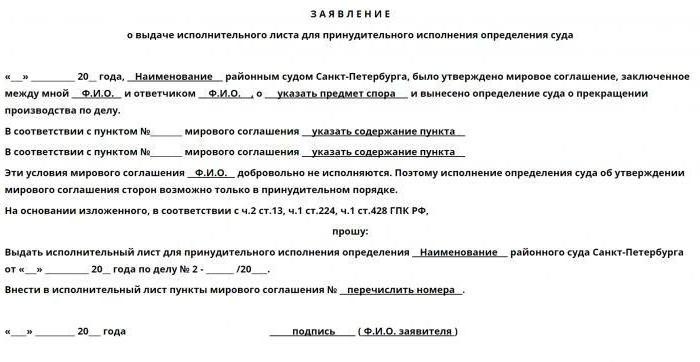Non-fulfillment of the settlement agreement in the civil process is a problem that takes place, and the injured party is not always aware of how to behave, what measures to take and what norms of the law to rely on.
Settlement agreement
Amicable agreement is the final document approved by the court in which the parties set forth a compromise solution to the dispute between them. The plaintiff waives the claim, and the defendant agrees to fulfill certain obligations. An example would be consent to pay the agreed amount of money or to take other actions, depending on the essence of the dispute. The agreement provides the defendant with a softened version of the outcome of the trial.

Non-fulfillment of a settlement in a civil proceeding is what the plaintiff expects last. After all, this document is the result of negotiations and concessions, to which both parties agree. The plaintiff receives satisfaction, even if not complete, while the defendant gets rid of the result of the court satisfying the lawsuit beyond his power. However, the problem exists.
Settlement Features
It is not a familiar transaction, and a penalty or other measures of influence are not provided. In addition, a claim can be sought. What to do if the participant in the process meets with the non-fulfillment of the settlement agreement in the civil process?
The settlement agreement has the nature of a judicial act. The prosecution of the refusal to fulfill it concerns either the official or an employee of the organization who are responsible for this. As a rule, the punishment concerns either the bailiffs or employees of the organization performing an intermediary function, for example, an accountant at an employing enterprise, who is obliged to make deductions from the debtor's income.
Legislative regulation
In the Code of Civil Procedure there is no concept of an amicable agreement in the civil process. He was given only a few words in the text of the law. In Russia at the time of the adoption of the procedural code there was almost no experience associated with agreements of this kind. And the participants in the process were left with ample room for maneuver in resolving their disputes. Their content is presented with one single requirement - it does not violate the law and the rights and interests of process participants and other persons.

Nothing is said about the consequences of its failure. The Arbitration Procedure Code, on the contrary, contains provisions that answer the question of how to solve this problem. But this concerns the arbitration process, how to solve the dilemma in civil matters?
Clarifications of the RF Armed Forces on the application of legislation on enforcement proceedings indicate that the person concerned must submit an application for the issuance of a writ of execution and turn to the bailiffs. The legal basis is the application of the law by analogy.
The court or the bailiff may refuse to issue a writ of execution or open a proceeding, because they have no information about the non-enforcement of the settlement agreement in the enforcement proceedings. This argument is unfounded, the bailiff is already obliged to ascertain, within the framework of the proceedings, whether the conditions of the agreement were fulfilled.
Is it possible for the plaintiff to refuse the agreement
The plaintiff may declare his refusal of the agreement and ask the court to resume the proceedings. The law does not provide for the obligation of the court to consider such a statement, and such actions are equivalent to sending a new claim on the same grounds to the same person. They entail a refusal to open proceedings.

Indeed, with the adoption of a determination, the process is considered to be terminated. The plaintiff then has the right to rely only on what is indicated in the settlement. Because of this, the consequences of non-fulfillment of the settlement agreement in the civil process for the claimant are more sad than for the debtor.
After what time to apply
An application is submitted for the issuance of a writ of execution to the court, which decided on a settlement. This can be any authority that approved the agreement.
The clauses of the agreement may contain the terms during which the parties fulfill its clauses. The term is established by reference either to a specific date, or to an event (the commission of any action) from which it begins.

Until they expire, none of the parties has the right to talk about non-compliance with the terms of the settlement agreement in the civil process.
The judge has the right to refuse to issue the sheet, citing the fact that the deadlines have not yet expired.
If the agreement does not say anything about the deadlines, the claimant has the right to ask for a writ of execution at any time, and the judge will most likely not refuse: there are no formal grounds for this.
It is impossible to delay the solution of these issues, the term for the execution of the judicial act is limited to 3 years. Exceptions to the rule are provided for in separate laws.
How to write a sheet application
The application is written in the name of the judge who decided on the settlement. It is indicated who the author of the application, if a representative acts, he must attach a copy of a power of attorney or other document confirming the authority (the child’s parents - birth certificate, guardian or trustee - decision of the guardianship authority).

The statement rewrites the operative part of the judicial act (to recover or oblige to transfer, etc.), here the text is compiled taking into account the provisions of the settlement agreement. In case of non-fulfillment of the settlement agreement in the civil process, a sample application for the issuance of a sheet is offered in the court office or on its page on the Internet. Sometimes a little help in the preparation of the text is provided by court staff, but you should not count on it, it is better to contact a lawyer. Then such scrupulousness?
Incorrect wording from the application will go into the writ of execution, and in the future there will be problems in the process of enforcement proceedings.
Court refusal to issue a writ of execution
In practice, courts issue sheets for all decisions they make. If a failure occurs, it is formalized by definition. It is appealed to a higher court by filing a private complaint 15 days after being made. If the judge delayed the issuance of the document, the deadline for filing a complaint is restored without any special difficulties.
If the refusal comes from the bailiff
Bailiffs often break the law by refusing to open enforcement proceedings. There are several reasons: workload, lack of knowledge of the legislation, including those regulating the activities of the bailiff.
The employee’s refusal to open proceedings is appealed to the head of the department, and then to the department or in court. The second method takes more time - it takes the preparation of a full-fledged lawsuit, but it is more effective. Judges often agree with the plaintiffs, and bailiffs, having received submissions to the court, try to cancel their illegal decision before the start of the process. And this despite the fact that a citizen or a representative of the organization has previously contacted them.
Consequences of Non-Performance
Negative for the plaintiff or claimant has already been said. What threatens the non-enforcement of the settlement agreement in the civil process to the debtor? The bailiffs have a number of powers that they must use to search for and recover property:
- the right to seize accounts and property owned by the organization or entrepreneur;
- seize property for sale at auction;
- the recoverer has the right to demand the accrual of a penalty for non-performance;
- accrual of performance fee if the court decision was not voluntarily enforced in the shortest possible time (7 days from the date of commencement of proceedings);
- penalty for unfulfilled monetary obligations is calculated.
The presence of debts, disputes, failure to fulfill obligations impede business, the reputation is seriously affected.

An entrepreneur conducting business without opening accounts is not easier. For example, bailiffs, looking for property, periodically visit the debtor's housing. All items not included in the list of property not subject to collection shall be taken away and put up for auction.
No one prohibits a recoverer from going to court, disputing the legality of transactions of a debtor with property. They can be recognized unlawful because of the desire to hide property without transferring in reality the right to it. This is practiced by tax authorities. As a result, debt will increase, but to other citizens and organizations.
Thus, the consequences of violating the settlement agreement in the civil process are no less painful than if the case ended with the adoption of a standard decision.
How to protect yourself by concluding a settlement agreement
In the agreement, the parties are entitled to indicate the consequences of non-fulfillment or violation of its conditions. Of course, you can’t prescribe its cancellation in these cases. But to increase the amount of the required amount or to prescribe other negative consequences as a protective measure is not prohibited. Not all judges share this position. Some servants of Themis believe that no sanctions can be provided for in a settlement agreement. They contradict its nature as a judicial act.
Breach of agreement
Violation of an amicable agreement in a civil proceeding means failure to fulfill its conditions. The case relates to the timing, as indicated above, and its other provisions. But if everything is relatively clear with the terms, how to evaluate other conditions? Here, most likely, it is also better to give an analogy of the law.
The order of its implementation is violated, as it is written in the agro-industrial complex, and the party is deprived of what it had hoped for by signing the agreement. The second component is taken from the Civil Code.
What lawyers say
What are the advice of lawyers for the failure to comply with a settlement agreement?
They are as follows:
- document violations;
- take into account deadlines;
- apply to the court for a writ of execution, and then to the FSSP to force the debtor to fulfill his duties.
The most important condition is to register the agreement in such a way as to minimize the negative consequences of the actual refusal of the other party.
Provide for transactions with property under the control of the requiere or claimant for the property, in particular, restriction on the prohibition of unlawful seizure from it. The purpose is to avoid ridding the debtor of property or cash until the plaintiff turns to the bailiffs.

Something similar is used by banks in transactions with mortgage apartments: a client who is not able to further pay a loan finds a buyer and sells housing under the control of the bank, returning money and getting rid of debt.
Obtaining a writ of execution, the start of production on it takes several weeks, during this period the debtor will have time to re-register all or part of the property.